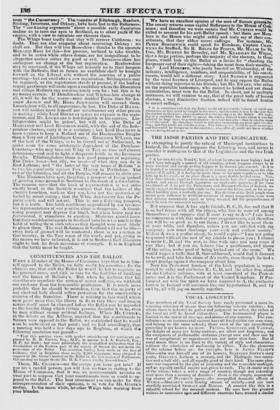THE IRISH PARTIES AND THE LEGISLATURE.
IN attempting to justify the refusal of Municipal institutions to Ireland, the Standard supposes the following case, and seems to consider it analogous to that of the Legislature and the two Irish parties.
A has two friends, Ii and C, both of whom he esteems most highly ; but B and C bare uuhappily it quarrel of old standing, which happens always to be more virulent and savage as they happen to be thrown into contact. Is it to be imputed as intentional disrespect, or as castiug any reflection upon the cha- racters of B and C, if A decline to invite them to his table together, or to take both up in his coach, or to place them in a spare auuble•Imided room. Now, it' for these friends, equal in estimation and in merit, but, alas ! estranged by an ancient, and except through separation an implacable quarrel,—if for these two friends of A we put the Protestants and Boman Catholics of Ireland, we surely suggest no disrespectful simile in the else of the latter, and, as far as po- litical hostility goes, a perfectly just one. The division of the Irish people were reason quite sufficient to withhold occasions of angry competition, even were that diviiioo numerically equal, or being unequal, aid the preponderance of me:it lie with the numer teal majot icy."
Bet suppose that A has eight friends, B, C, D, &c. and that B is on bad terms with all the others, who live in concord among themselves; and suppose that B were to say to A--" I can have no communien with this mob of' Your acquaintances, and therefore von will be so good as to cut them; / do not like to meet them at your table, and therefore, unless you are satisfied with my companv, you must discharge sour COA and eschew society.' Ueless •A were a perfect ninny, he would reply—" lain not going to quarrel with all the rest of my friends to please you; I choose to invite C, D, and the rest, to dine with me; you may come if you like ; but if you do, behave like a gentleman, and throw off'the sulks, under peril of being kicked out of the room." We would wager a trifle that B, thus addressed, would find it discreet to be civil, and take his share of A's turtle, even though he had a secret grudge against the company about him. Now the Protestant fraction of the Irish population is repre- sented by sulky and exclusive B ; C, D, and the other five, stand for the Catholic millions, with at least one-third of the Protest- ants; and A is the Parliament of the United Kingdom. If Par- liament act with the spirit we have imputed to A, the exclusive faction in Ireland will succumb like our its pothetical B, and by atel by, all will jog on merrily together.


























 Previous page
Previous page